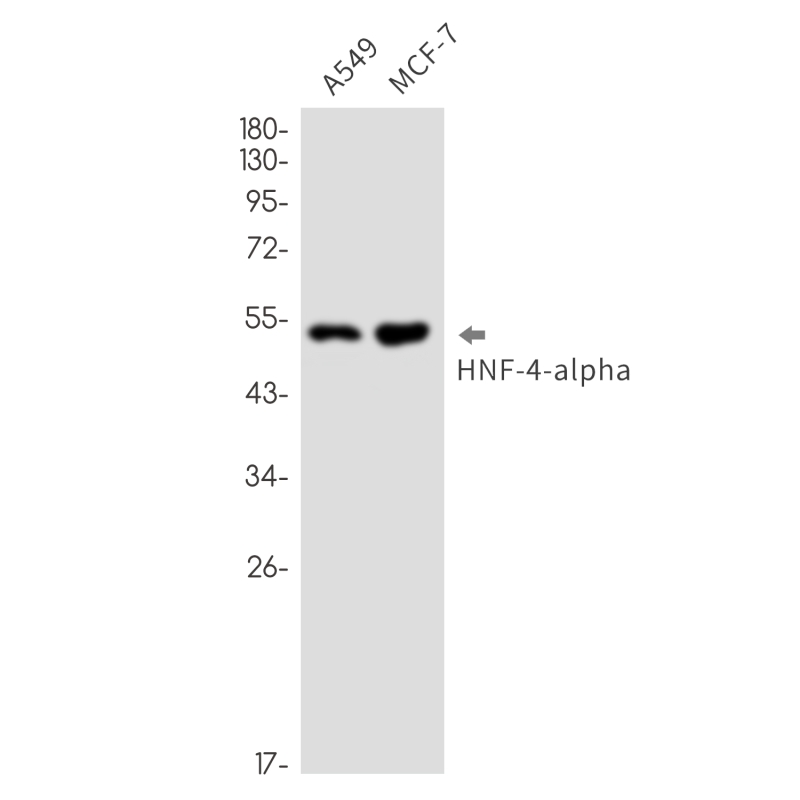
| WB | 1/500-1/1000 | Human,Mouse,Rat |
| IF | 1/20 | Human,Mouse,Rat |
| IHC | 咨询技术 | Human,Mouse,Rat |
| ICC | 技术咨询 | Human,Mouse,Rat |
| FCM | 咨询技术 | Human,Mouse,Rat |
| Elisa | 咨询技术 | Human,Mouse,Rat |
| Aliases | TCF; HNF4; MODY; FRTS4; MODY1; NR2A1; TCF14; HNF4a7; HNF4a8; HNF4a9; NR2A21; HNF4alpha |
| Entrez GeneID | 3172 |
| WB Predicted band size | Calculated MW: 53 kDa; Observed MW: 53 kDa |
| Host/Isotype | Rabbit IgG |
| Antibody Type | Primary antibody |
| Storage | Store at 4°C short term. Aliquot and store at -20°C long term. Avoid freeze/thaw cycles. |
| Species Reactivity | Human |
| Immunogen | Recombinant protein of human HNF-4-alpha |
| Formulation | Purified antibody in TBS with 0.05% sodium azide,0.05%BSA and 50% glycerol. |
+ +
以下是关于HNF4α抗体的3篇参考文献及其摘要概括:
1. **"Hepatocyte nuclear factor 4α (nuclear receptor 2A1) is essential for maintenance of hepatic gene expression and lipid homeostasis"**
- **作者**: Hayhurst, G.P., Lee, Y.H., Lambert, G., Ward, J.M., Gonzalez, F.J.
- **摘要**: 该研究利用HNF4α特异性抗体,通过免疫组化和Western blot分析,发现小鼠肝脏中HNF4α缺失导致脂质代谢相关基因表达异常,证实其在维持肝脏基因表达和脂质稳态中的关键作用。
2. **"Defective mutations in the hepatocyte nuclear factor 4α gene in maturity-onset diabetes of the young (MODY1)"**
- **作者**: Yamagata, K., Furuta, H., Oda, N., et al.
- **摘要**: 研究通过Western blot和免疫荧光技术,使用HNF4α抗体检测患者样本,首次发现HNF4α基因突变与MODY1型糖尿病的相关性,揭示其在胰腺β细胞功能中的重要性。
3. **"HNF4α regulates intestinal epithelial cell proliferation via Wnt/β-catenin signaling"**
- **作者**: Battle, M.A., Konopka, G., Parviz, F., et al.
- **摘要**: 利用HNF4α抗体进行染色质免疫沉淀(ChIP)和免疫组织化学,发现HNF4α通过调控Wnt通路靶基因影响肠道上皮细胞增殖,为肠道发育和疾病机制提供了新见解。
这些文献均涉及HNF4α抗体在基因调控、疾病机制及细胞功能研究中的具体应用,涵盖蛋白质定位、表达分析和靶基因鉴定等方法。
Hepatocyte nuclear factor 4 alpha (HNF4α) is a transcription factor belonging to the nuclear receptor superfamily, primarily expressed in metabolic tissues such as the liver, pancreas, kidneys, and intestines. It plays a critical role in embryonic development, tissue-specific gene regulation, and maintaining metabolic homeostasis by binding to DNA as a homodimer and modulating the expression of target genes involved in glucose, lipid, and drug metabolism. HNF4α dysfunction is linked to monogenic diabetes (MODY1), hepatic cancer, and inflammatory bowel diseases, highlighting its clinical significance.
HNF4α antibodies are essential tools for detecting and quantifying this protein in research and diagnostics. These antibodies are commonly used in techniques like Western blotting, immunohistochemistry, and chromatin immunoprecipitation (ChIP) to study HNF4α's expression patterns, subcellular localization, and regulatory mechanisms. Due to the existence of multiple isoforms (e.g., HNF4α1 and HNF4α2) generated by alternative splicing, antibody specificity is crucial. Many commercial antibodies target distinct epitopes, such as the C-terminal ligand-binding domain or N-terminal activation domain, enabling isoform-specific studies. Their applications extend to investigating disease mechanisms, drug responses, and developmental biology, particularly in contexts where HNF4α acts as a master regulator of epithelial cell differentiation and metabolic zonation in organs like the liver. Validated HNF4α antibodies are indispensable for advancing research in diabetes, cancer, and metabolic disorders.
×